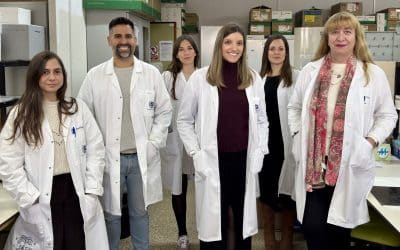- This work, within the framework of personalised and precision medicine, could facilitate early diagnosis and allow personalised treatment for multiple diseases linked to obesity and its comorbidities.
Researchers from the Malaga Biomedical Research Institute and Nanomedicine Platform (IBIMA Plataforma BIONAND), based at the Virgen de la Victoria University Hospital, have published a pioneering study that could transform the way obesity is understood and treated.
team, belonging to several thematic areas of the Centro de Investigación Biomédica en Red (CIBER): Physiopathology of Obesity and Nutrition (OBN), Diabetes and Associated Metabolic Diseases (DEM) and Cardiovascular Diseases (CV). This collaboration has significantly enriched research focused on proteomic analysis to unravel the molecular mechanisms underlying obesity.
The study, published in the scientific journal ‘Current Obesity Reports’The study, ‘Proteomics of obesity’, conducts a systematic review of 16 proteomics studies analysing samples from people with obesity compared to normal-weight individuals. The results identify 41 proteins altered in obesity, many of which are involved in metabolic pathways, oxidative stress, inflammatory processes and cell structure. This finding not only sheds light on the mechanisms of obesity, but also suggests possible biomarkers for its progression and associated diseases.
Obesity is a significant health problem because it increases the risk of developing several serious diseases. People with obesity are more likely to develop type 2 diabetes, cardiovascular diseases such as hypertension and heart attacks, and several types of cancer. In addition, obesity is linked to chronic inflammation and hormonal changes that can aggravate these and other medical conditions.
Proteomics is a discipline of molecular biology that focuses on the comprehensive study of the proteins present in an organism, cell or tissue at a given time. It uses a variety of analytical and bioinformatics techniques to identify, quantify and characterise proteins, as well as to understand their functions, interactions and post-translational modifications. By providing a comprehensive view of proteins, proteomics plays a fundamental role in the understanding of biological processes, disease and the development of personalised therapies.
In this regard, the co-coordinator of the scientific area ‘Cardiovascular diseases, obesity and diabetes. Environmental determinants and style
Mora Murri, a Miguel Servet researcher at IBIMA Plataforma BIONAND, highlighted that ‘proteomics represents an interesting tool for understanding obesity at the molecular level, since, thanks to it, key proteins have been identified that could be used as biomarkers for metabolic diseases such as obesity and its related diseases, as well as representing possible therapeutic targets for these diseases’. Thus, Murri added that ‘it represents a significant advance towards personalised and precision medicine, allowing to improve the clinical management of obesity and its comorbidity towards more effective and specific treatments for each patient’.
Dr. María Insenser, from CIBERDEM, who together with Dr. Murri has coordinated this study, has highlighted that: ‘Our analysis integrates multiple proteomic studies performed on several types of human biological samples. This has given us a global perspective that helps us to better understand how proteins interact with each other in obesity.
For her part, the first author of the work, Alba Rodríguez, indicated that:’ The systematic review of 16 proteomics studies has identified 41 altered proteins in people with obesity, which are related, among others, to inflammatory processes, oxidative stress, metabolism, and other factors.”.
The findings of this systematic review not only provide a deeper understanding of the pathophysiological mechanisms of obesity, but also open the door to the development of potential biomarkers for the monitoring and personalised treatment of obesity and its comorbidities. The study highlights the need to integrate multi-omics approaches to achieve a more comprehensive view of molecular processes in obesity.
In addition to researchers from IBIMA Plataforma BIONAND and the Hospital Universitario Virgen de la Victoria, the Bioinformatics Unit of the Institute itself, together with the University of Malaga, have collaborated in this study, and members of the Centro de Investigación Biomédica en Red Enfermedades Cardiovasculares (CIBERCV) and the Centro de Investigación Biomédica en Red de Diabetes y Enfermedades Metabólicas Asociadas (CIBERdem) - both attached to the ISCIII - , the Instituto Ramón y Cajal de Investigación Sanitaria (IRYCIS), together with the Hospital Universitario Ramón y Cajal, the University of Alcalá and the University of Tehran (Iran).
About IBIMA Bionand Platform
IBIMA Plataforma BIONAND is a multidisciplinary research area in biomedicine that revolves around the Regional and Virgen de la Victoria University Hospitals in Malaga, together with Primary Care, and the biotechnology groups of the University of Malaga.
Its objective is to promote research of excellence, preferably oriented towards translational research, favouring the obtaining of results that are transferable to clinical practice and biotechnological applications.
It allows the development and promotion of a multidisciplinary biomedical research area that contributes to the scientific basis of the programmes and policies of the National Health System, preferably promoting translational research at the biomolecular, clinical, epidemiological and technological levels that facilitates the transfer of the scientific advances obtained in the prevention, diagnosis and treatment of the most prevalent health problems at regional, national and international level.
IBIMA Plataforma BIONAND integrates more than 70 research groups from the University of Malaga and the Public Health System of the health centres that comprise it.
About the CIBER
The CIBER (Consorcio Centro de Investigación Biomédica en Red, M.P.) depends on the Instituto de Salud Carlos III -Ministerio de Ciencia e Innovación- and is co-financed by the European Regional Development Fund (ERDF). The CIBER is organised into different thematic programmes, each focusing on a particular area of biomedical research, and brings together different research groups from all over the country, promoting interdisciplinary collaboration and the exchange of knowledge. In this case groups from the CIBEROBN De Fisiopatología de la Obesidad y Nutrición (CIBEROBN) have taken part, dedicated to research in areas related to obesity, nutrition and associated metabolic diseases; CIBERCV, which focuses on research into diseases of the heart and circulatory system and the CIBERdem CIBERDEM de Diabetes y Enfermedades Metabólicas Asociadas (CIBERDEM), which is dedicated to research into diabetes mellitus and other related metabolic diseases.



